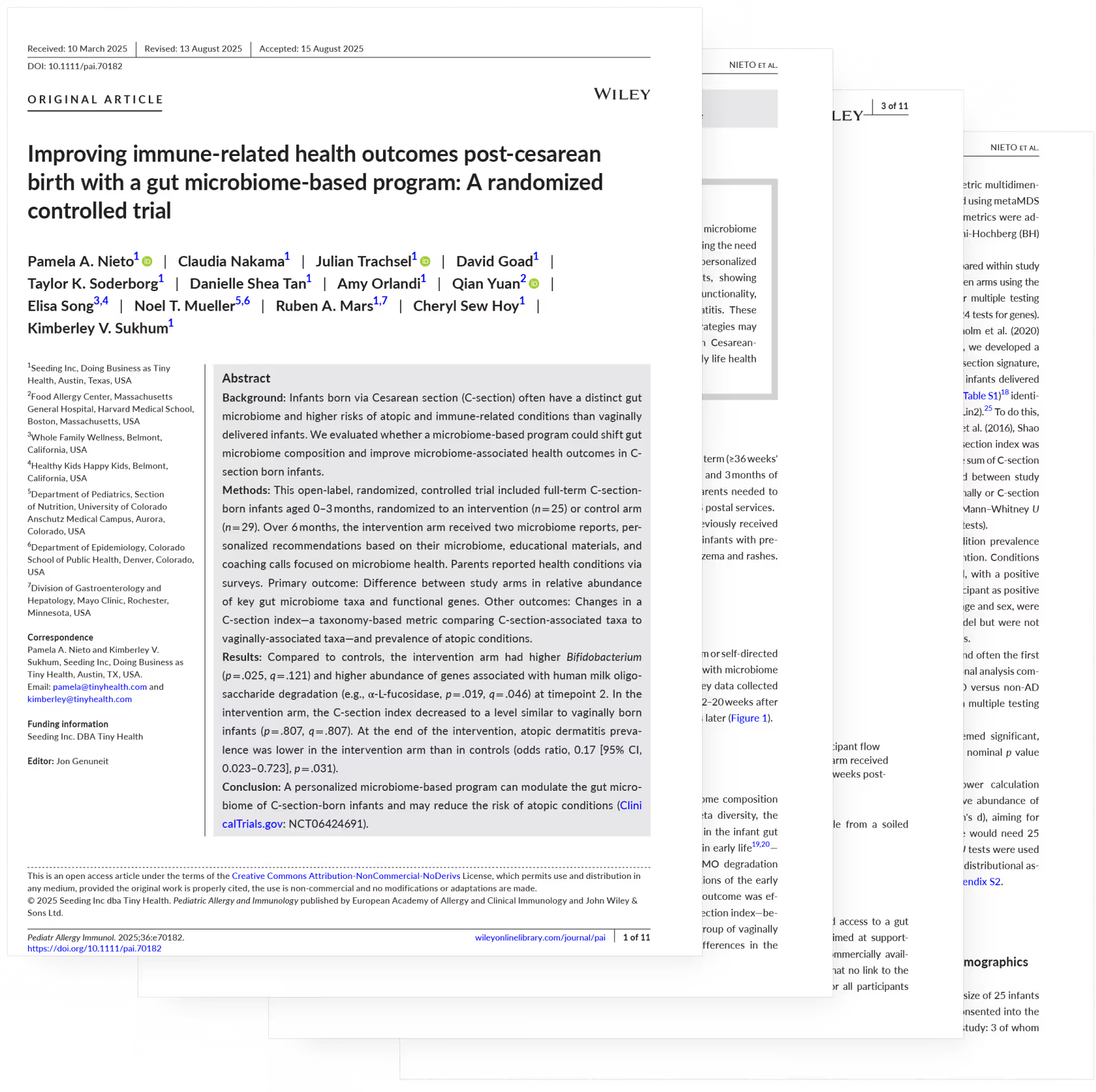We're Rewriting the Story for Babies Everywhere
Every baby deserves the healthiest start. Our groundbreaking study shows babies given personalized microbiome support had 83% lower odds of eczema risk and improved gut health. Published in Pediatric Allergy and Immunology.
DOI: 10.1111/pai.70182



Over 40%
of children in the U.S. live with at least one chronic condition
20 million
children in the U.S. have a diagnosed allergic disease
71.6%
increase in atopic dermatitis over the past three decades

Many factors beyond your control can affect your baby's health
C-sections, antibiotics, and other interventions are sometimes necessary, but they can affect a baby's health in ways many parents don't realize. During vaginal birth, babies are exposed to beneficial bacteria from their mother. If anything disrupts this process, or if mom is missing key bacteria, their baby may miss this crucial first dose of healthy microbes which can lead to:
- Higher risk of eczema (33% more likely by age 3)
- More hospital-associated bacteria
- Increased chance of food allergies and asthma
- Less diverse gut bacteria, fewer protective species

Real results. Real improvement in health outcomes.
Real results. Real improvement in health outcomes.
The Infant Restore study followed 54 healthy C-section babies for 3 months. Babies who received personalized microbiome testing, targeted probiotics, and expert guidance had dramatically better outcomes—including 83% lower odds of developing eczema compared to babies who received no intervention.
What we saw in the study
These are the highlight results from our randomized controlled trial, published in Pediatric Allergy and Immunology, Sept 2025
Increased protective Bifidobacterium
Babies in the program had much higher levels of Bifidobacterium, the beneficial bacteria that help babies digest breastmilk nutrients, build a strong immune system, and lower the risk of chronic inflammation.
Stronger capacity to digest breastmilk nutrients
These babies showed stronger ability to break down and use the healthy components in breastmilk that can help develop the immune system and reduce the risk of viral and bacterial infections.
Fewer reported health conditions, including atopic conditions
Parents reported significantly fewer health issues in babies who received the targeted microbiome support, especially allergic conditions.
Decreased c-section microbiome signature
By the end of the study, C-section babies who got personalized support had gut bacteria that closely resembled vaginally-born babies—a complete transformation.
The data behind the breakthrough
We measured multiple health markers in these babies over six months. The results tell a powerful story: personalized microbiome support transforms gut health, strengthens digestion, and reduces disease risk across the board.
Higher B. infantis levels

Figure 1. Relative abundance of Bifidobacterium infantis across both groups and time points. Median B. infantis relative abundance at time point 2 was 61% in the intervention group vs. 3.4% in controls (p = 0.001, q = 0.013). The thick line within the box represents the median, and the lower and upper boxes represent the 25th and 75th quartiles of the data, respectively. Individual values are shown as circles. Significance: q < 0.05 **, q < 0.01 ***, n.s. = not significant.
Increased HMO digestion potential: 2,3-2,5-a-sialidase

Figure 2. Gene levels of sialidase across both groups and time points. These HMO-degrading genes increased in the intervention group (p = 0.019, q = 0.046; and p = 0.012, q = 0.033, respectively). The thick line within the box represents the median, and the lower and upper boxes represent the 25th and 75th quartiles of the data, respectively. Individual values are shown as circles. Significance: q < 0.05 **, q < 0.01 ***, n.s. = not significant.
Lower C-section index

Figure 3. C-section index at time points 1 and 2 for both study groups, compared to C-section- and vaginally-delivered infants from Shao et al. (2019). The thick line within the box represents the median, and the lower and upper boxes represent the 25th and 75th quartiles of the data, respectively. Individual values are shown as circles. Significance: q < 0.1 *, q < 0.01 ***, n.s. = not significant.
Fewer health Conditions

Figure 4. Percentage of infants with any reported health conditions at each time point. By the end of the study, the intervention group had fewer infants with reported health conditions overall (p = 0.004).



Read our finidings white paper
Our team prepared a white paper going over our findings, observations, and the road that brought us to the Infant Restore Study. You can read it for free, here:

Give your baby the best start
Get the same personalized microbiome care that helped babies in our study thrive. Test your baby's gut, get expert guidance, and reduce their risk of eczema and other health issues.